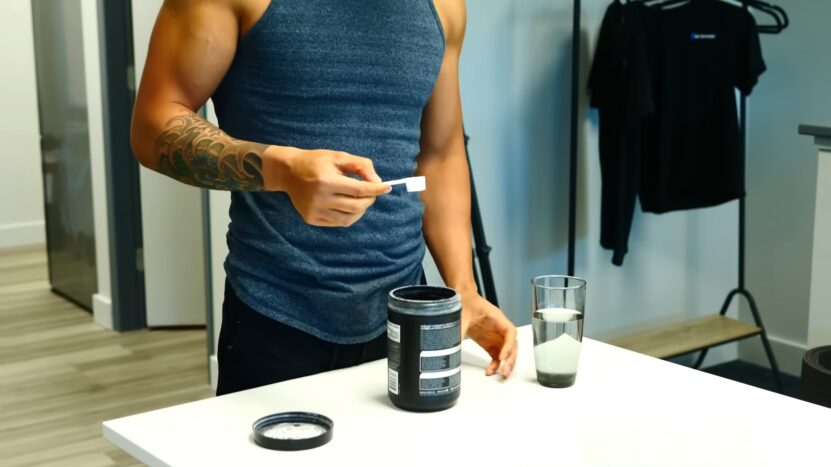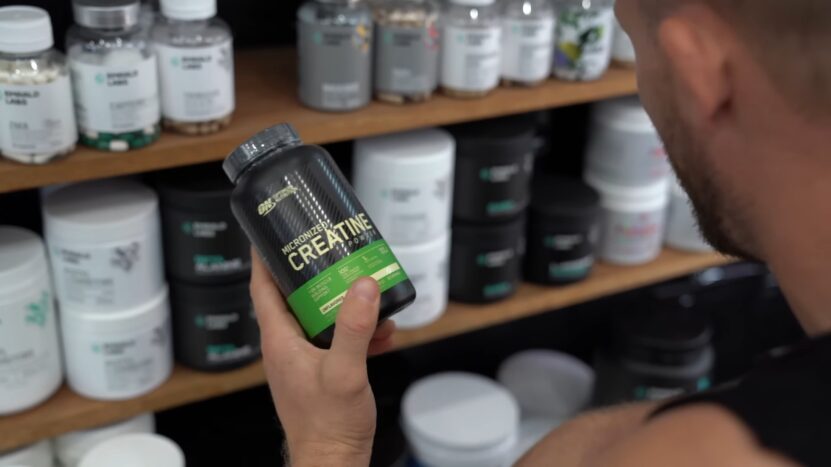When it comes to enhancing athletic performance and improving muscle growth, two supplements often come to mind: creatine and protein supplements. Their popularity in the fitness community raises a critical question: is it beneficial and safe to combine them?
Synergistic Effects on Muscle Growth
The combination of creatine with protein supplements could potentially offer synergistic effects. Creatine provides energy for workouts, while protein aids in recovery and muscle building.
Enhanced Workout Performance

By combining the immediate energy boost from creatine with the muscle repair benefits of protein, you may experience enhanced overall workout performance. This combination can lead to improved strength and endurance during your training sessions.
Accelerated Muscle Recovery

Post-workout, this mix might speed up muscle recovery. Creatine reduces muscle damage and inflammation, while protein provides the necessary components for muscle repair.
This dual approach can result in quicker recovery times and less muscle soreness. We also have to mention some other methods that will improve the recovery and prevent swelling, soar arms, and other issues. One of the best solution is to go to the sauna before or after the intense workout session.
| Effect | Description |
|---|---|
| Enhanced Workout Performance | The combination provides immediate energy from creatine and supports muscle repair from protein, improving overall performance. |
| Accelerated Muscle Recovery | Quicker recovery times and reduced muscle soreness due to the dual benefits of creatine in reducing muscle damage and protein aiding in repair. |
| Improved Strength and Power | Research suggests that the combination can lead to enhanced strength and power during high-intensity exercises. |
| Muscle Mass Gain | When used with resistance exercise, the combination may promote muscle mass gain, aiding in muscle growth. |
| Minimized Side Effects | Cycling creatine and proper protein intake can help minimize potential side effects like gastrointestinal distress and water retention. |
| Individual Variation | Effects can vary from person to person, depending on factors like diet, training regimen, and tolerance to supplements. |
| Optimal Timing | Timing matters for both supplements; pre-workout protein provides amino acids for exercise, while post-workout protein aids recovery. |
How to Combine Them Properly?

While mixing these supplements can be beneficial, there are a few considerations to keep in mind.
Proper Dosage and Timing
It’s crucial to follow recommended dosages for both supplements. Overconsumption of protein can strain the kidneys, while excessive creatine usage might lead to gastrointestinal issues. Timing is also key; creatine is often taken pre-workout for energy, while protein is typically consumed post-workout for recovery.
Individual Needs and Goals
Consider your fitness goals and dietary needs when deciding to mix these supplements. For some, the combination may offer significant benefits, while for others, it might be unnecessary. Always consult with a healthcare professional before starting any new supplement regimen.
Why is Creatine Important?
Creatine, a substance found naturally in muscle cells, boosts physical performance in short, high-intensity activities. It’s synthesized from amino acids and helps regenerate a molecule called ATP, which is your body’s primary energy currency.
How it Works?
In your muscles, creatine is stored as phosphocreatine. During high-intensity exercise, phosphocreatine is converted into ATP, providing immediate energy. This process enhances strength, aids in muscular endurance, and speeds up recovery.
Benefits for Athletes
Research shows creatine improves strength, power, and high-intensity exercise performance. It can also assist in muscle recovery post-exercise, reduce muscle cell damage and inflammation, and increase muscle mass when used in conjunction with resistance exercise.
Protein Supplements Are Essential for Best Results
Protein supplements, usually in powder form, provide essential amino acids crucial for muscle repair and growth. They’re popular post-workout to aid in recovery and muscle synthesis.
Role in Muscle Growth
After a workout, your muscles are primed for repair and growth. Protein provides the necessary building blocks, known as amino acids, for this process. It supports muscle repair, reduces muscle soreness, and aids in the synthesis of new muscle tissue.
Varieties and Uses
These supplements come in various forms, including whey, casein, and plant-based options like soy or pea protein. Each type offers specific benefits, but all provide the essential amino acids needed for muscle recovery and growth.
Balance is Crucial
One strategy that athletes and fitness enthusiasts often consider when using creatine is “cycling.” Creatine cycling involves alternating between periods of creatine supplementation and periods of abstaining from it. This approach aims to maximize the benefits while minimizing potential side effects.
Creatine Cycling

The idea behind creatine cycling is that by taking breaks from creatine supplementation, you can prevent your body from becoming overly reliant on external sources of creatine. This may help maintain your body’s natural creatine production and sensitivity to it.
Typical Patterns
Cycling patterns can vary, but a common approach is to cycle creatine in phases, such as:
Loading Phase
During the loading phase, individuals typically take a higher dose of creatine for a short period, usually around a week. This phase aims to saturate muscle cells with creatine quickly.
Maintenance Phase
Following the loading phase, individuals switch to a lower maintenance dose. This phase can last for several weeks to months, depending on individual preferences.
Rest Period
After the maintenance phase, individuals take a break from creatine supplementation, allowing their body to return to its baseline creatine levels.
Pros and Cons of Cycling

Pros
- Minimized Side Effects: Cycling can help reduce potential side effects like gastrointestinal distress and water retention, especially during rest periods.
- Sensitivity Maintenance: Cycling may help maintain your body’s sensitivity to creatine, potentially enhancing its effectiveness when reintroduced.
Cons
- Disruption: Cycling can disrupt continuous supplementation, potentially leading to fluctuations in creatine levels and benefits.
- Individual Variation: Not everyone may benefit from cycling, as individual responses to creatine vary.
Is Cycling Necessary?
Cycling is not mandatory for creatine supplementation. Many individuals experience significant benefits from continuous use without cycling. Whether you choose to cycle or not depends on your goals, tolerance, and preferences. It’s essential to monitor your body’s response and adjust your approach accordingly.
Protein Timing and Dosage
Consuming protein before your workout can provide a source of amino acids during exercise. This can be particularly beneficial if you’re engaging in prolonged or intense training sessions.
- Post-Workout Protein: The post-workout window is a crucial time for protein consumption. Consuming protein shortly after exercise helps kickstart the muscle repair and growth process, reducing muscle soreness and aiding recovery.
- Protein Requirements: They vary depending on factors like age, gender, activity level, and fitness goals. A general guideline is to aim for 1.2 to 2.2 grams of protein per kilogram of body weight per day for individuals engaged in regular physical activity.
Spread Protein Intake
It’s beneficial to spread your protein intake throughout the day. Instead of consuming all your protein in one meal, aim to include protein in each meal and snack to support continuous muscle protein synthesis.
Individual Variations
Remember that individual variations play a significant role in determining your optimal protein timing and dosage. Experiment with different approaches to find what works best for your body and your fitness goals.
FAQs
Do I need creatine if I take protein?
No, you do not need creatine if you take protein. Creatine and protein are different supplements that have different effects on muscle growth and performance. Protein provides the building blocks for muscle tissue, while creatine helps increase energy and strength.
Does creatine grow muscle faster than whey?
Creatine and whey protein both contribute to muscle growth, but in different ways. Creatine helps increase the amount of energy available for short bursts of high-intensity exercise, which can lead to more work done and more muscle stimulation. Whey protein provides the amino acids needed for muscle repair and synthesis after exercise. Both supplements can be beneficial for muscle growth, but neither is superior to the other.
Does creatine increase testosterone?
There is no conclusive evidence that creatine increases testosterone levels. Some studies have suggested that creatine may increase the conversion of testosterone to dihydrotestosterone (DHT), a more potent form of the hormone, but the effects are unclear and may vary depending on the individual. Creatine may have other benefits for hormone function, such as increasing insulin-like growth factor 1 (IGF-1), which is involved in muscle growth.
Can I mix creatine with coffee?
Yes, you can mix creatine with coffee, but you may want to be careful about the amount and timing of caffeine intake. Caffeine is a stimulant that can enhance alertness and performance, but it may also have diuretic effects, which can increase urine production and dehydration. This can interfere with the absorption and utilization of creatine in the body. It may be best to limit caffeine intake to moderate amounts and avoid taking it close to your workout.
Does creatine have side effects?
Creatine is generally considered safe and well-tolerated, but it may cause some minor side effects in some people. These may include bloating, stomach discomfort, dehydration, dry mouth, muscle cramps, hair loss, and damage to the liver and kidneys. However, these side effects are rare and usually occur when taking too much creatine or larger doses than recommended. To minimize the risk of side effects, it is advisable to follow the dosage instructions, drink plenty of water, and consult a healthcare professional before taking creatine.
Last Words
Before incorporating these supplements into your regimen, consult with a healthcare professional or a registered dietitian. They can provide personalized recommendations based on your specific needs and ensure you’re using these supplements safely and effectively.
Remember that supplements should complement, not replace, a balanced diet rich in whole foods. While creatine and protein powder can be valuable tools in your fitness journey, a holistic approach to nutrition and exercise remains the foundation of success.
In the world of fitness and nutrition, there are rarely one-size-fits-all solutions. Your unique circumstances, goals, and preferences should guide your choices. Whether you decide to mix creatine with protein powder or use them separately, prioritize your health and well-being above all else.
